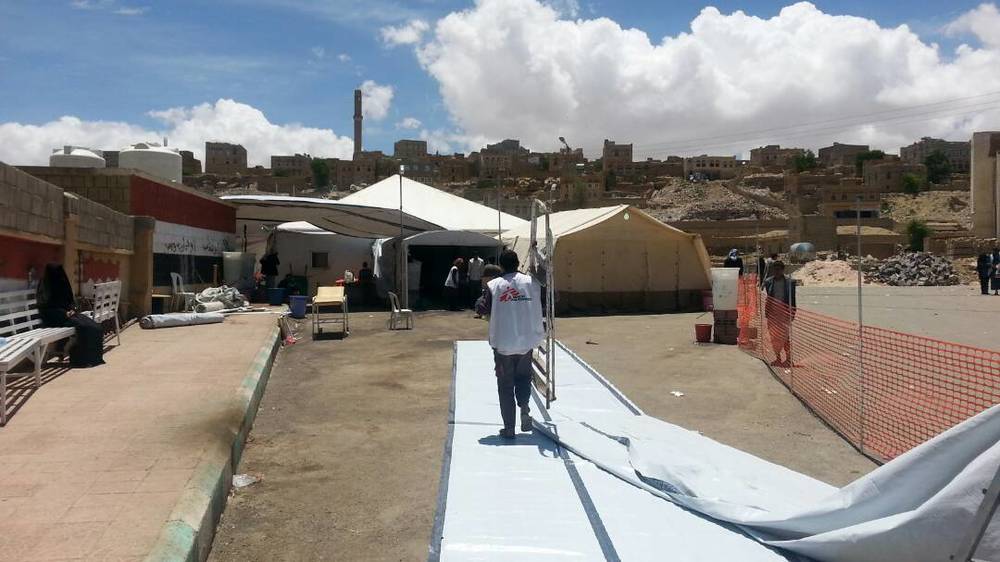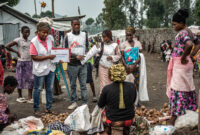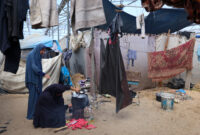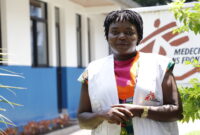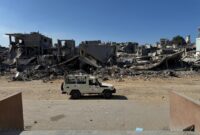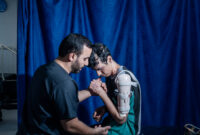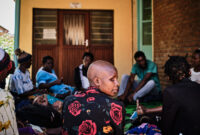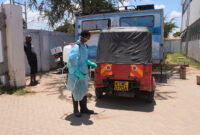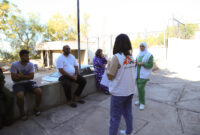Diving into the unknown: A Canadian Expat discusses the recruitment process for his first MSF mission
Thomas Briand is a Canadian from Montreal embarking on his first mission with Doctors Without Borders/Médecins Sans Frontières (MSF). He will be working in Hajjah, Yemen for six months as a Finance and Human Resources manager. Briand provides valuable, personal insight on the MSF recruitment process and why he chose to transition into the humanitarian sector.
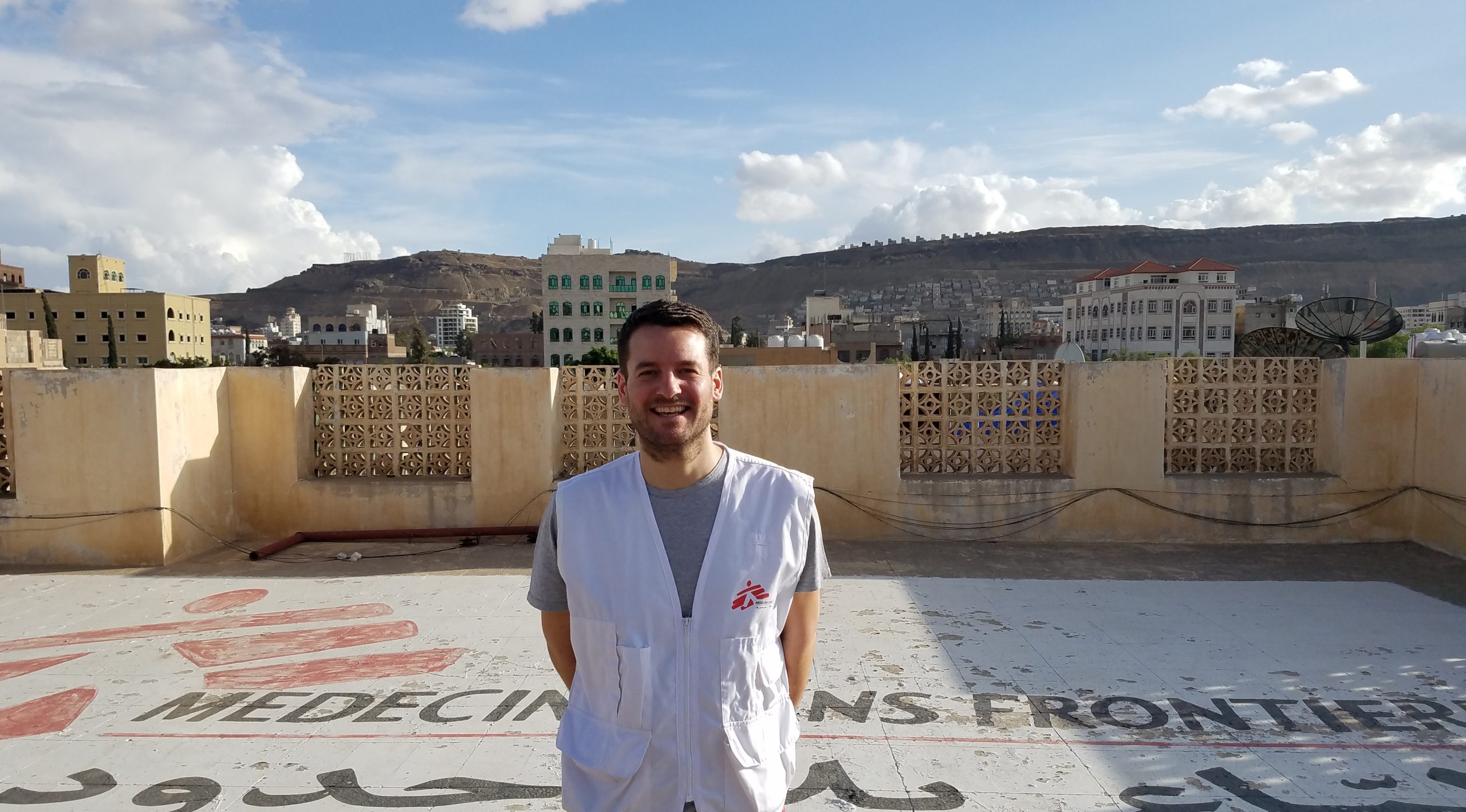
March 6, 2020
I’ve always loved airports. Mostly because they symbolize escape, to places perhaps far away, but perhaps also because we rarely have the time to watch people, that is, as long as you get there early enough to catch your flight. There you see, by turn, the harried businessman, the parents stressed out by the excitement of their children at the prospect of leaving on vacation, the backpackers who are barely visible beneath the weight of the huge backpacks that hold their entire lives. There you witness emotions, sometimes punctuated with tears, tears of happiness at being reunited with friends or tears of heartbreak signalling the start of another separation.
Sitting serenely in my black leather chair, waiting for my flight at Pierre Elliott Trudeau Airport in Montréal, I feel a sense of contentment. I glance at the screen which shows Doha, where I have to change for a flight to Djibouti, before finally arriving in Yemen.
On my way through London last summer, Mel, my very good British friend told me: “Tom, you really need to write about your MSF experience and share it. You need to start now, in order to explain why you are doing it and before you forget how you felt before you set foot there.” So, prompted by others I decided to start writing. First, in order to describe and convey the moment or the emotion while it is fresh, in order to avoid the changes that occur over time. Put down on paper, and then transcribe those living moments when I first came in contact with doctors from MSF and the people in countries who are suffering, either fleetingly or permanently. Using the written word to also share with friends and loved ones, using a medium other than the normal one that photos, videos, statuses or stories have become. Using the medium of the written word to lessen my apprehension at returning to the mission, in order to avoid the blank stares when asked “So, how was it?” preferring instead more pointed questions. And then, somewhere, writing to calm myself and reassure myself, knowing that I am not alone in the many trials and tribulations that I am experiencing with this endeavour.
So, here I go, in chronological order.
June 2018
The hotter weather is finally starting to make one forget the shivers that come with winter. At the end of another exhausting work week, Lisa, one of my neighbours at the Imperial Loft in Montréal, suggests that I join her on the rooftop terrace for a drink one Saturday noon. We often get together there with other neighbours from the condo, where life is good. When we talked, Lisa had told me that a friend of hers was in town and would also be joining us.
Maher arrived 10 minutes later. With his mixed-race complexion and tidy black beard contrasting with his shaved head, he inspires confidence and empathy right from the start. Originally from Syria, Maher exhibits a friendly smile and speaks with a calm voice. One is naturally at ease in his presence. As is often the case in this type of situation, once beyond the customary greetings and salutations, I asked him what he does.
“I work in Human Resources, in recruiting”
“Oh yeah, me too! In what field?”
“I work for an NGO. Médecins Sans Frontières. Are you familiar with it?”
“Of course, I responded, with an assurance that masked my actual familiarity with the organization.”
And then 10 minutes. No more. Maher explains to me that he has completed three missions as an HR and finance person in Iraq in 2015 (six months), then as HR coordinator, first in Turkey with the Syria mission (nine months) and in Niger in 2017 (11 months). He is currently based in Toronto and is responsible for recruiting humanitarian field workers. His experience allows him to easily respond to the barrage of questions I fire at him. My head is turning, and the hamster wheel in my brain is spinning furiously. Through a number of more thinly veiled questions, I try to find out from him if my profile would match his search criteria. The answer is yes.
I, who had often claimed that life’s road was fashioned by meetings, had just witnessed the perfect illustration of this. I remember that all of a sudden, everything became clear, just like a ray of sunshine piercing through the clouds and instantly lighting up the entire room. The evidence was too strong and this seemed so completely natural. In the greatest tranquillity on a sunny Saturday mid-day on the roof of an apartment building in downtown Montréal, I was also going to do everything I could to join MSF. It’s funny. I, who sometimes go back and forth in front of a store window trying to decide on a pair of shoes, on that day, in the space of 10 minutes, made a decision that will probably impact me for the rest of my life.
That’s when everything started. And each of the steps that were to follow would reinforce even more my new life choice.
A few days later, I called Maher so that he could finish convincing me, although that was not really necessary. In August, I informed my then-current manager of my intentions for the following summer, probably breaking an advance-notice record for Quebec. In November, I attended an MSF open recruitment information session, even though my thorough research had already cleared most of the way for me being able to access the information. During the session, I listened wide-eyed, like a child listening to stories of their grandfather, to the stories of workers who had recently returned from a Congo mission in North Kivu. In December, I officially took the first step in my recruitment by writing a letter setting out my motivations and updating my CV to meet MSF format requirements. This proved to be the most rigorous process I had ever encountered in my entire career. It involved two interviews (not with Maher, in order to avoid any potential conflict of interest) and a number of online tests, some of which were time-limited. It was not until March that I would have a positive response. Despite that, driven by my determination, my solid conviction that I would meet all the criteria, and certainly by the alluring scent of risk, I announced to my manager in January that I would be officially resigning, effective June 2019.
May 2019
I attended two welcome days in Toronto, where others like me, recruited from all over Canada, come together to learn more about MSF, including such things as its organizational structure, values and operations. Lastly, I met with other individuals who had the exact same mind-set as me: they’re ready to set off on a mission where nothing was known. Not when, not where, not how, not how long, not exactly what. But how good it was to be able to talk with others, such as surgeons, doctors, midwives, nurses, logisticians, and water purification experts! For me, this was like discovering a whole new world. One of the many other participants, the Director of Human Resources looks us straight in the eye and tells us: “You’re here for at least one mission. But I would like it if you could spend the rest of your careers with us.” My hard drive is connected. I’m recording.
July 2019
I’m invited for two weeks of PPD – Preparation for Primary Duty.
At the first one in Barcelona, Spain, there are thirty-five of us from all over the world. As the only French-speaking representative, I am, paradoxically, like a fish out of water, water that appears to me to be a turquoise blue. Ninety percent of the participants work in the field of medicine in their native countries, and the average age of the group must be around 32.
On the first morning of training, the icebreaker games are helpful, but not essential, since the icepack around us had quickly melted away the night before, at dinner. Among us, the atmosphere is unbelievable, since our many differences are instantly eliminated by our common goal. We were housed in a former monastery that reminded me of a summer camp, with shared rooms and cafeteria-style meals served in a common dining room; our days were full, with events normally running from 8:00 a.m. to 6:00 p.m., but the time passed faster than a Tour de France time trial. In the hot, humid air with the fans blasting away, speakers followed one after the other and we often participated in group discussions on a whole host of topics: operational centre strategies (OCBA – Operational Centre of Barcelona Athens), resiliency in the field, management, security (an entire day was devoted to this alone), managing budgets, and types of medical operations performed, to name only a few. But the high point, in the outside courtyard, one whole afternoon was devoted to a simulation exercise wherein we had to lay out the foundation for an emergency camp for a group of refugees – IDPs (Internally Displaced Persons.) I was gradually attempting to assimilate the vast new jargon that I was being exposed to.
A short flight later, the second week took place in Geneva. There, we were housed in the John Knox residence, surrounded by trees and fields, an estate formerly used to host ambassadors which, judging from the photos that adorned the walls, once had the honour of hosting Nelson Mandela. The new recruits in attendance would be mostly working in the field with duties the same as mine, managing human resources and finance. We were much fewer in numbers – just about a dozen – but all of us bore a multi-cultural stamp. Finally, we would be learning in much greater detail what would be expected of us: recruitment, payroll management, performance monitoring, how the employee management software operates (which, by the way has the exceptional ability of running without internet access), cash management, financial reporting, etc. My initial impressions were highlighted by the maturity of the HR tools, certainly more advanced than what I had been able to observe in my career. I then begin to understand how the experience that I would have thought up until then would be a source of personal enrichment would also be an important step forward in my professional career. And then I began to question myself. How can you have more robust tools when, by its very nature, MSF is an emergency-focused organization, and therefore in a permanent state of flux? I would surely find the answers a few months later, when I was in the field.
One evening we took advantage of an opportunity to tour Geneva, which was a ten-minute walk and a fifteen-minute bus ride away. It was a pleasant warm summer night, and the stars were out in all their glory. I was with Hermann, with whom I had shared my room since the first night in Barcelona. My “roomie” as he liked to call me. Hermann is Cameroonian. He’s a big guy, sort like a big teddy bear, with a round face, very short hair and big round expressive black eyes which, along with his smile, make him especially endearing. Shy by nature, he is extremely polite, often giving the impression that he is afraid that he is disturbing me. Sitting comfortably on the patio of this bar, I was about to discover even more of the story behind this man that would move me deeply. Hermann had not had a lot of opportunities to leave Cameroon prior to the PPDs. That was the first time that he had travelled to Europe. He had made it a clear career goal to work in the humanitarian field, and MSF was a dream for him ever since he witnessed, up-close and personally, the 2015 attacks carried out by Boko Haram in the far north Cameroon town of Maroua. He had also worked in the area of human resources, but he explained that, unlike me, it would have certainly been much more difficult for him to be recruited by MSF if he had not been to the Institut Bioforce, a specialized school, for three months in Dakar, Senegal, something that cost him the substantial amount of 6,000 euros. Hermann had to manage that within a family budget, in addition to the tragedy that he had experienced. A few days after the birth of his little girl four years ago his fiancée died as the result of complications following childbirth. He has been raising “his little angel” ever since, with the help of his in-laws. When, with a heavy heart, I asked him how he is able to manage the situation, and whether or not it will be too difficult for him to leave her behind during the months he is on a mission. He looked me straight in the eyes, and with calm conviction said to me directly “Yes, but life has its ups and its downs, and you have to make sacrifices for others.”
As we strolled back to the residence, the night stillness was interrupted only by the hum of a few insects. Looking at Hermann beside me, I say to myself that we obviously do not come from the same life situation or even destiny, and I am thinking to myself how lucky and proud I am to count him among my new colleagues. We will meet again one day, my friend. Among the extraordinary people that I have chanced to meet so far as I begin the early steps leading up to the start of the MSF human adventure, Hermann is certainly the one person who has had the greatest effect on me. So I smile to myself as I imagine what awaits me once I cross the starting line of my first mission.
After the PPDs were over, one thing remained uppermost in my mind, and that was the fact that the human dimension is central to everything. But this was not new for me. The companies where I had worked previously used to hammer this home. “Without our employees, we are nothing; employees are our most important asset!” While that was actually true, I used to repeat it often myself to potential recruits, and I really believed it. But at MSF, I would understand that the word “human” meant something different. It has to be said that it helps when the President of MSF Spain is introduced to us, in shorts and flip-flops, while strongly emphasizing the fact that the number one objective of his organization is to save the greatest number of lives—not to sell airplanes or wait for the next level of growth or aim for excellence. Save lives. Nothing less. Central to the presentations by all the speakers was the human dimension associated with the patients, obviously, but also the welfare of the staff and volunteers, and the importance of transparency with the all-important donors.
August 2019
Back in Canada, I’m still patiently waiting for the actual news of the destination for my first mission, all while carrying on with all the requisite pre-departure procedures: medical tests, vaccinations, numerous forms to be filled out, and an appointment with a psychologist – all supported by the devoted teams at MSF Canada in Montréal.
It’s a long wait. Every day, I scroll through my emails numerous times, and my heart starts beating faster each time I miss a call when I look to see its from. I’m waiting along with Sadia, a Canadian originally from Djibouti, who lives in Gatineau, a city across the river from Ottawa, in Quebec. I had met her at the PPDs. She was also getting ready to leave for her first mission and leave behind her family and her job in finance with the government. At 25. You really have to admire her. Would I have been able to do that at her age? We have fun trying to guess the destination of our first mission. The bet is on one of the countries in Africa.
Ironically, it was Maher who was the one to give us the news. Since our first meeting, his job had changed to that of career manager, and I am one of the employees under his direction! So, it is he who is in contact with Barcelona to try to match me with a field need. It will also be his job to maintain contact with me during my mission in order to ascertain how things are going, and to prepare for the next one.
It’s a strange feeling. While I know right now much more about MSF and what I will be doing there, there is nothing that is completely known. “It depends!”, I’ve heard these words more than a hundred times from the mouths of people I have had contact with and it’s always an excellent firewall for dealing with questions. It depends. Oh, the famous unknown! I have to say I like the expression a lot. Not knowing something in advance has for a long time been more a source of excitement than of fear. It’s become a part of me. Just as when you examine a gift that you’ve just received, I can so far make out the shape, but I don’t know what’s inside it. And this is deliciously motivating. I’m slow in opening it. I believe that my life needs to be interspersed with these types of gifts. Each of these is a source of change and forces me to take a different direction in order to experience several lives in one. MSF is therefore perfectly positioned to respond to these desires for the unknown and for change. And this gift is a big one, because everything is going to be different and new: the country, people, culture, language, job, humanitarian field, medical world, lifestyle, cuisine, and even the distractions needed to help pass the time… everything.
So, you need to adapt if you want to succeed. And I don’t feel like I’m powerless! The times I lived in France, in Australia, in England, and in Canada have helped shape me. My travels to Southeast Asia, Africa and South America helped me develop. Each of those experiences has strengthened my openness and my ability to adapt. So, with them duly arranged in my backpack, how will the unknown be able to lead me astray?
September 19, 2019
I check my phone before getting in the shower, just in case. The Outlook icon is displayed. An email from Maher! It’s going to be Yemen! So be it. I look at a map of the world. Okay, I see where it is. Maher adds that I need to take time to reflect, especially given the situation on the ground. The email includes a dozen attachments (a presentation on the country, its culture, the project and the security situation) and asks me to get back to him with my answer by Monday. This is because, as we are often told, we can refuse if we are not comfortable with a mission’s destination, especially in view of the level of risk involved. MSF will never force us, and the answer is up to us. Back in the shower, initial images are already starting to swirl around in my head. The next day, after I had closely scrutinized the documents like a student before an exam, I advised Maher that there is no reason why I would refuse, and so there’s no need to wait until Monday, because you have to start somewhere, especially where the impact is potentially the greatest! So I would be setting out for 6 months in Hajjah, in Yemen – a country that has been in the throws of war since 2015 with the worst current humanitarian crisis, according the UN. For Sadia, it’s going to be the Central African Republic.
I’ve got news! I am happy to finally be able to tell my friends and loved ones my destination and something other than “I still don’t know. There’s no average wait time. It depends! I’m still waiting for news. I’ll keep you posted.” So, I’m not hiding my enthusiasm as I tell them. Their reactions are different. Some who, knowing the situation in Yemen, answer me back right away with a DM or an emoji with a face representing the level of problems with my future country. And some ask me first if I’m okay before searching on-line, before coming to the same reaction as the first ones. Yes, I’m happy, because I’m not familiar with the Middle East, and since I was not hoping for any one destination more than another, I couldn’t actually be disappointed. “But there’s a war there! Are you going to be safe? Aren’t you afraid?” The issue of security obviously underlies all the questions, and my own as well, initially.
Ever since I first began researching MSF, this aspect always stood out. I learned that there were security experts within the organization who are responsible for dealing with these subjects. I saw that the statistics on the number of incidents involving MSF workers were very low. I saw how seriously the subject was and that they have strict protocols to be followed. My confidence in MSF’s level of maturity is very high. So, no, I was not especially afraid.
It takes an average of 8 weeks to get a visa for Yemen, which meant that my official start date would be November 20, 2019. But it depends! Once more, when it comes to MSF, flexibility is key, and without this arrow in my quiver, I would not be able to achieve much. It seems that sometimes they even call it MSFlexibility. So, as it turns out for me this wait time is longer, much longer. Visas are doled out in dribs and drabs by the government of a country engaged in a slow-motion war, and its opaqueness makes getting information on progress of matters even more difficult than driving on a North American superhighway in a thick winter fog.
So I, who last June thought that I would be able to leave around September 2019, find myself at the airport on March 6, 2020, after having filled in the time with a trip to Laos and Vietnam, working in a Quebec coat store, wonderful year-end holidays and a great deal of waiting during the longest January and February in history, at least in my own lifetime. So here, when I thought that I would be able to celebrate New Year’s 2020 at a hospital in the mountains of Yemen, I find myself on a Montreal rooftop, watching fireworks and throwing snowballs like party favours at my friends.
If patience is an art, I will feel slightly more akin to Banksy from now on. I don’t know if one day I will be able to thank my kind friends for their gracious hospitality for having so kindly let me stay with them for all these months. They are the first to find out when, on February 17, I finally receive the news that set me free. I will be leaving in two weeks, which in the end turns out to be slightly more than 3 weeks, for the somewhat inglorious reason that I had been confused as to the date of my initial flight, the reason for which still escapes me to this day. Unconsciously, I had surely come to value more highly the time I spent waiting in Montreal than I had thought.
Pre-departure
Sitting on this bench nearest the departure gate, I’m trying to understand what brought me to this place, and what I was looking for from this adventure. Maybe it was a matter of being able, upon my return, to amuse myself with a game of comparisons.
“Do you want to be happy? Travel with two bags—one for giving and one for receiving,” said the 18th-century German writer and philosopher Johann Wolfgang von Goethe, whose words seem to be resonating in me today.
My reflection brings me back to the major reason that I was motivated to work in the humanitarian field nine years ago when I entered the door of that foundation supporting street children in Manila, with my London friend Tina: to give back, regardless of the form or how small the impact may be, to those who were not fortunate enough to be born under the same star as me, whether this be in terms of geographical location, level of education or health. Through this new life choice, it’s perhaps the need to seek out some sort of vestige of comfort in order to try and alleviate this sense of guilt in the face of the inequality of choices, however uncontrollable, that I sometimes feel.
But if having a positive concrete impact on others is obviously my principal motivation, I can’t overlook the fact that I am also looking for both human and professional enrichment. How could this type of adventure be a success if it were just a sacrifice for others?
I want to seek out and experience meaningful collective adventures, help others get through the worst kinds of situations and take up mighty challenges. At a time when everything seems to always be proceeding apace, I’m looking to come to grips with the times in a different way and be able to establish deep human relationships with the people around me within this specific context.
It is also to discover myself and always remain within new, remote cultural horizons, which are sometimes opposite to my own by travelling to an inaccessible country (I googled “flights to Yemen” to convince myself) and have the privilege of working side-by-side with its inhabitants and seeing their resilience in their world that is at war. I want to be able to read myself where and when I decide, without having to use a screen, as I attempt to understand a human reality that is often beyond me.
I am expecting to be able to grow professionally, to put myself in danger in a new world. I’m anxious to see how I can put into practice the skills that I have developed over eight years through my experience in the field of aeronautics. And I’m curious about everything. How do you manage a humanitarian organization in the same way you manage a company that builds airplanes? What type of logistical structure do you need to access the most remote areas in record time? What relationships would you need to establish with the local actors in order to be able to safely access the people our mission attempts to serve and still respect our principles of neutrality, impartiality and independence? I’ve time to ask myself so many questions. I’m now more impatient than ever to get answers.
Sitting here, on this bench, I feel I’m ready. But am I really? Like a lawyer who has carefully prepared his client’s defence, I move calmly forward toward the judgment. But just the trial alone will be the judge. And what if the opposing party should come in and attack from an unexpected angle, leading to my destabilization and turning the trial into a fiasco, what then?
I’m not particularly afraid that will happen, although I’m not sure that my outer shell, the one that guarantees a certain distance from lived events, will be thick enough. Only the future will tell. As an optimist by nature, I think, perhaps naively, that things will go well. But whatever happens, I will cross that bridge when the river presents itself.
But right now, it’s time to get out my boarding pass.
To those who have read these initial jottings, I thank you sincerely. You surely constitute a strong and support by my side, and I will attempt to help you experience, to the extent possible, the human adventure that awaits me.
